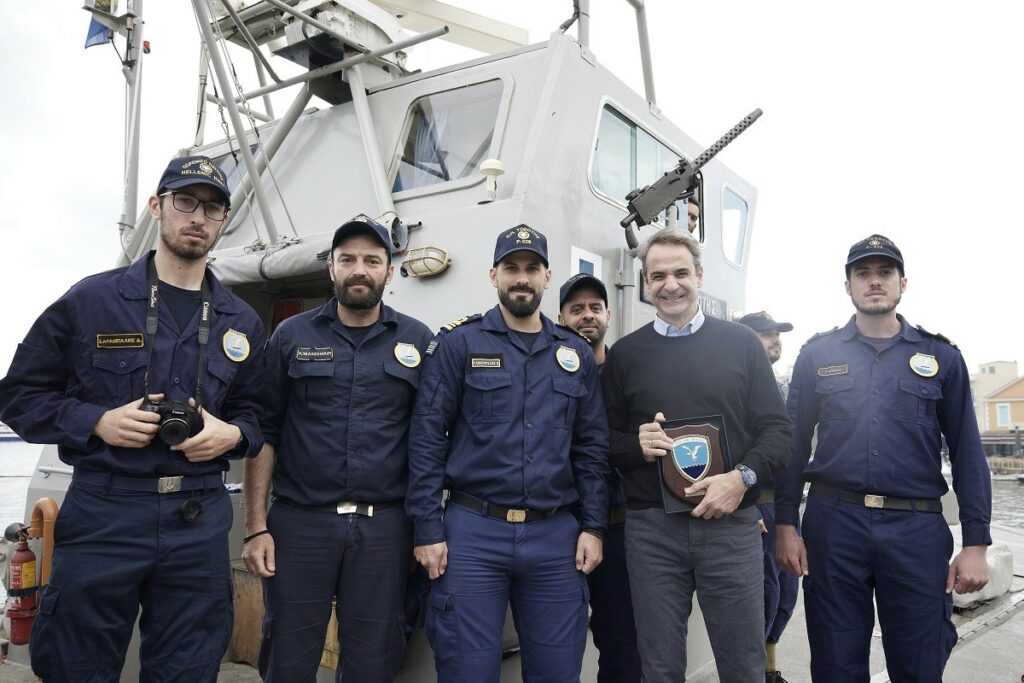
JINSA upgrades Hellas and Cyprus and directly proposes to the USA to strengthen their ties with Hellenism.

File Photo: Prime Minister of Greece Kyriakos Mitsotakis. Photo via Twitter, PrimeministerGR
The articles that have been already written about the crucial geopolitical role of Hellenism are many. These papers have written by Americans experts who belong to the top American think tanks like CFR. Honestly, it is rare to find researches that have been conducted in the grace of Hellenism.
One of them has been recently organized by a significant American-Jewish think tank, the well known JINSA. Without a single doubt, how Hellas and Cyprus are depicted and unfolded as geopolitical actors by prominent American think tanks are beneficial for Hellenism because of the Hellenic and Cypriot authorities could calculate more accurate their policies. In other words, Hellas and Cyprus could augment the veracity of their SWOT analysis. What are the main points of JINSA’s study? Why we must invest our diplomatic capital in these arguments?
Keywords: Greek-American relations, four cycles of Greek geopolitics, American support to Greek role, Balkan Peninsula, North Africa, Black Sea, Middle East, counterbalance of Turkey’s aggressiveness, cooperation among Greece, Cyprus, Israel, Saudi Arabia, UAE, Egypt, and Jordan, FMF, EDA, IMET, further American presence in Greece.
The central argument of this study is based on two hypotheses: Firstly, the Eastern Mediterranean has become again a crucial crossroad for the US vital interests. Those interests are manifold. Secondly, Turkey’s role has become hostile to American interests. The rational combination of two hypotheses drives to the American need to strengthen its ties with Hellas. Much of the work has already done by the trilateral cooperation among Hellas, Cyprus, and Israel. The current study is separating the Hellenic strategy into four cycles. We could claim that JINSA’s analysis is narrowed to unfold the combination of the two main factors that strengthen and ensure the Hellenic-American ties. The important issue that should be studied carefully by the Hellenic and Cypriot officials, is that JINSA underlines its proposal to the USA officials that is no other than Americans put on the first place their relations with Hellenism.
- Even in the preface, JINSA’s analysis refers to two facts that taking place in the Eastern Mediterranean. Russia, China, and Iran are challenging the USA in the Eastern Mediterranean and Turkey keeps its distance from the West. Greece is trying to fill the Turkish void that has been left in the area in the grace of the USA. The Balkan Peninsula, the region of North Africa and the Eastern Mediterranean are connected and the Greek role has already been upgraded. The stable behavior of Greece towards the USA even in the era that the Greek government of Tsipras was in power, is highly underlined in JINSA’s analysis.
Furthermore, this paper calls for American actions to secure their allies in a way that Washington should put an end to Turkey’s intimidation in the Eastern Mediterranean. The USA should support Greece, Israel, Cyprus, and Egypt not only at a rhetoric level. JINSA’s argument is enforced by the experts’ specific proposals to the US administration. First of all, the sources of the so-called FMF (Foreign Military Financing) should be augmented to give the appropriate military equipment to Greece. Secondly, there are other ways to strengthen collective security in the region to promote American interests. The International Military Education and Training (IMET) procedure, should also be a part of the bilateral relations between the USA and Greece.
At the same time, the activation of EDA (Excess Defense Articles) is also required. Moreover, the American military presence in Greece should be bolstered by the US administration and not only that but also, Washington should strengthen its military knot with Nicosia which was blocked by the US arms embargo to Cyprus. Τhe expansion of the Suda Bay and the exploitation of air and naval base in Alexandroupoli is also required to be part of the US policy towards Greece.
- The geopolitical analysis of the Greek role in a greater area using an analytic method of four cycles.
The geopolitical terms that Greece should take into consideration, comprise a key factor to unfold the Greek role in the region. JINSA’s group defines the Greek role using four cycles. The Balkans, the Black Sea, the Middle East, and North Africa. These subregions are connected by Greek geography and simultaneously, the USA has important interests to protect in each subregion. These common ground of Greece and USA interests, boost further the Greek-American relations.
- The Balkan Peninsula.
In the Balkan Peninsula, Russia and Turkey are trying to expanse their influence. Since Turkey abandoned its European aspirations, (to be a member of the EU) is executing a unilateral plan towards the Balkan Peninsula. Part of this new-ottoman plan, are the military agreements with Albania and North Macedonia. At the same time, Russia desires to achieve more control over the Balkans (Russia tried in 2016 to coordinate a cup in Montenegro because the last moved closer to NATO).
The other threat for American interests is the Chinese inroads in the Western Balkans with the so-called China 16+1, which is the entry-level of the Belt and Road Initiative. The last April, Greece had become a member of the Chinese initiative in the Balkans. Greece’s historical role in the Balkan Peninsula could benefit the USA to secure its interests at the time that Turkey doesn’t abide by the western doctrines in the area.
- The Black Sea.
Another subregion that is very important for both Greece and the USA is the Black Sea. The Ukrainian crisis unfolded that the Russian role in the area should be countered. The annexation of Crimea by the Russian Federation also has been seen as a dynamic come-back of Russia in the Black Sea. The common concern for both Greece and the USA is to balance the Russian weaponization of energy to influence the EU by deepening the dependence of the European market on Russian hydrocarbons.
Moreover, Greek membership in NATO is affected regarding the potential projection of NATO in Eastern Europe while the Ukrainian crisis has not finished yet. The TAP pipeline is under construction and when it is ready to transport natural gas, it will link TANAP with Italy via Greece. The IGB will also reduce the European diversification in the energy sector. To cut the long story short, Greece and the USA have the same goals to accomplish in the Black Sea.
- The Middle East.
It was no sooner than the beginning of the Syrian crisis that Greece took into consideration the area of the Middle East as one of its geopolitical priorities. This new prioritizing has taken place since Turkey decided to blackmail the EU and Greece by allowing thousands of migrants and refugees to cross the borders of Greece. Μoreover, Greece has stopped to shun to play a role in the Middle East. Of course, Greece will never achieve to fit into Turkey’s shoes regarding the Middle East.
For Greek geopolitics, the Middle East and North Africa are separate subregions and Athens challenges different interests in each region. Firstly, Greece’s anxiety is growing about the Turkish-Qatar axis which supports the Muslim Brotherhood. Putting aside the Turkish-Qatari axis, Iran has gained its geostrategic upgrade in the Middle East and Greece tried to counter Tehran’s influence in the Eastern Mediterranean. It is beyond any doubt that Turkey’s aggressiveness comprises the major factor which drives Greece to strengthen ties with states in the Middle East such are Israel, Jordan, UAE, and Saudi Arabia.
On the other hand, North Africa is also a terrain that Greece has a lot of challenges to face. The situation in Libya is critical as a consequence of the Arab Spring and Turkey took advantage of Libya’s instability. Frankly speaking, Turkey had tried to expand its influence before signed a memorandum with Libya regarding EEZ. Erdogan supported the regime of Morsi in Egypt but he failed to keep him in power. The current government in Egypt couldn’t be more distanced from Turkey but the Muslim Brotherhood is still strong in Egypt. Greece has signed trilateral cooperation with Egypt and Cyprus using the model of the other trilateral cooperation with Nicosia and Jerusalem.
- The Greek interests in both the Middle East and North Africa have a common resultant; the deterrence of the Turkish role and the projection of power (in cooperation with Italy) in the grace of the whole EU. To cut the long story short, Athens is making efforts to present itself as a state of stability in a region that the instability gains ground. The Greek anxiety flows from the constant Turkish distancing from the Western Alliance. It has been a long time since Turkey abandoned the role of NATO’s pillar in the region. So far, Greece is gaining American reliability. For Athens, filling the vacuum that Turkey has already left in the region and simultaneously deterring Ankara’s aggressiveness, comprise its major geostrategic goals.
It is very interesting the JINSA’s insight about the current transformation of the Greek foreign policy, in comparison with the Greek strategy of previous decades that has been taken place. In this paper, there is a reference to PASOK of the 1980s which provoked serious problems to NATO alliance and Reagan’s Administration. The flash-back that has been made through the history of Greek-American relations (and starts with Truman’s Doctrine in 1947) could describe Greece as a difficult ally for the USA. Especially the anti-Americanism which has been spread by Andreas Papandreou’s rhetoric after the fall of Greek Junta, was an obstacle that could penetrate every aspect of Greek -American relations.
The Greek openness to the Arab World has been taken place in a way that was very disturbing for both West and Israel. Andreas Papandreou had already recognized PLO before 1982 and embraced the anti-Israel rhetoric while he was calling the USA as ”Mecca of Imperialism”. Τhe USA and the other allies in the European Union were very anxious about the Greek regime which opened dialogues with authoritarian regimes like the Syrian one. During the ’90s the Greek attitude remained the same. JINSA’s team that conducted the current study, call Greece the ”enfant terrible” of the West. The War in Kosovo brought Greece on the same page with NATO with great reluctance because public opinion supported Serbia. The Greek-Turkish crisis regarding the Ocalan issue at the end of the last decade of the 20th century proved the problematic relations between Greece and the USA.
The Anti-Americanism had left its footprint in Greece after the American support of Greek Junta. Ironically, Alexis Tsipras, the leader of a leftist party was him that put an end to an era of Anti-Americanism that used to be supported as a narrative by Greek left-wing. He agreed to further exploitation of Suda Bay by the USA, he also agreed to give the airbase of Larissa to the USA to develop the UAV’s and he was the one that warmly built the Greek-Israeli relations. Besides, he signed agreements with other American allies in the region such as the UAE. Now, New Democracy is in power and its traditional pro-Western orientation will boost further Greek-American relations. Of course, some limitations define the Greek geopolitical transformation. Greece is the last member of China 17+1 and is also a crucial member of the vast Chinese commercial project, Belt and Road Initiative. Russia has still its influence in Greece, especially in Northern Greece. After the ejection of the two Russian diplomats, Alexis Tsipras tried to smooth Russia’s feathers. The same had done Kyriakos Mitsotakis before came in power. However, Greece won’t change its strategic orientation and it is quite possible to remain a pro-western state. The reasons for this stable behavior flow from Turkish behavior and Greek new role regarding the energy sector.
- The Greek -Turkish relations.
JINSA’s group of research strongly mentions the traditional tensions that define Greek-Turkish relations since Greek Independence from the Ottoman Empire. The first years of AKP in Turkey could be described as calm for Greek-Turkish relations. The maintenance of this constructive point that Greece and Turkey reached after the Turkish ”zero problems with the neighbors” policy and the Greek support to Erdogan to achieve its major goal to approximate EU, fell through after the Greek-Cypriot voting against the Annan’s Plan. The second factor that drove the Greek Turkish relations to mount a tensive escalation was that Turkish-EU’s relations soured after 2005. The irritant issue that worsened again the Greek-Turkish relations, was Turkey’s attitude towards Cyprus’ and the status under which Turkey could recognize a full member-state of the EU.
- The rise of a new confrontation in Greek-Turkish relations began when Turkey ushered at the Organization of Islamic Cooperation the issue of Muslim minorities in Greece who are located in Thrace. Moreover, Turkey tried to prompt Albania and North Macedonia to create an alliance among them by signing military agreements. After 2010, Aegean, Cyprus, and EEZ became again the main issues that comprised a constantly augmented list of disputes regarding Greek-Turkish relations. The natural gas’ discoveries in Greek and Cypriot waters, was the detonator of the traditional dispute that harasses the Greek-Turkish relations which is no other than the legal status of the Aegean and Cyprus.
Turkey is violating constantly Greek and Cyprus waters and airspace. Turkey claims that the islands that belong to the Greek territory should not be counted when determining an EEZ. Ankara’s policy towards Aegean and Cyprus is similar to China’s one in the South China Sea. The restrictions of Greek-Chinese relations start and finish at this point. In the meanwhile, Turkey’s adventurism in Syria needs Russia’s protection and support. Erdogan and Putin have become close allies especially after the failed coup that has been taken place in Turkey in July of 2016. This is another indicator that shows the restrictions of Greek-Russian relations.
At the same time, Turkey limits its connectivity with NATO role in the region. The East Med Gas Forum includes every state in the subregion of the Eastern Mediterranean except Turkey. Greek-Russian relations have also another problem and this refers to the reduction of Russian influence regarding the energy sector. Russian policy which could be described as ”weaponization of energy” to deepen the dependence of EU to Russian gas, is contrary to Greek energy policy which narrows to make Athens energy hub in the region and to upgrade Greek geoeconomic role into the EU. All these results in Greek orientation which bands with NATO and the USA.
- The Spring of Greek-American relations.
Since 2017, and under Syriza rule, Greece upgraded its military ties with the USA. In February 2017, 8 UH-60 Black Hawk helicopters and other pieces for the 10th Combat Aviation Brigade’s to support NATO response to Russian activities in Ukraine, arrived in Greece. Furthermore, Greece augmented the purchase of American military equipment. Greece has already spent the amount of 546$ million to upgrade 85 F-16 to F-16 Viper. The total amount of current purchase reaches 1 billion $. James Mattis underlined in 2018 the extraordinary level of Greek-American cooperation regarding the sector of Defense. Mattis made a separate mention to the military assets that Greece allowed to be exploited by the USA (Suda Bay, Larissa’s base, Volos’ base and Alexandroupolis’ one). The American Ambassador in Greece stressed out during his visit to Suda Bay that the bilateral relations in the defense sector were ”higher than it has been in decades”.
The Mutual Defense Cooperation Agreement that signed Greece and the USA in Athens on October 6th of 2019 during Mike Pompeo’s formal visit, placed in black and white the strong military ties between Greece and the USA. It is o high importance that JINSA claims that the USA prefers to deploy the already mentioned bases than to open new. In Volos, there are at least 350 American troops and 20 American helicopters and the UAV’s (MQ-9 Reaper) operated out of Larissa, developing the ISR (Intelligence, Surveillance, and Reconnaissance) for the first time in Greece.
- The Israel factor in Greek foreign policy.
Turkey’s shift in the Middle East has brought a lot of problems regarding Turkish-Israeli relations. The Greek-Israeli ties hadn’t reached a degree of progress before the Turkish policy changed. The constant worsening relations between Israel and Turkey brought Greece and Israel closer in terms of strengthening diplomatic and strategic ties. It was no sooner than 2010 when George Papandreou and Benjamin Netanyahu decided to look further regarding Greek-Israeli relations. The common interests between Greece and Israel that boosted their bilateral relation, were based on the perception that they had to face a common threat. This threat was Turkey.
After the Mavi Marmara incident, the Turkish – Israeli relations met their nadir. This deterioration between two states that have been cooperating for decades with the USA in the Middle East, (the strategic triangle among the USA, Turkey, and Israel) drove the Israeli Government to ensure its western geostrategic depth by approaching Greece and Cyprus. In the meanwhile, Greece had already signed a Memorandum with IMF and EU which reduced its economic power and by strengthening the ties with Israel could balance the constantly escalating Turkish threat. The exciting issue concerning the Israeli’s perception of Greece was that four different prime ministers were stable regarding the new Greek policy towards Israel. The fields that boosted the most the Greek-Israeli relationship were Defense and Energy.
The Houston-based Energy company, Noble Energy brought closer Israel and Cyprus. Jerusalem and Nicosia had already resolved their water borders to start the exploitation of natural gas fields that had been discovered by 2010. The year of 2012 was crucial about the trilateral among Greece, Israel, and Cyprus. In 2017, Greece, Israel, Cyprus, and Italy agreed to the construction of the East Med pipeline which can carry up 16 bcm of natural gas from Israeli gas fields to Europe via Greece. That was a milestone that drove Israel, Greece, and Cyprus to sign in the January 2nd of 2020, the agreement of East Med. It was only ten days ago that Eastern Mediterranean Security and Energy Partnership Act had already become the law of the state of the USA.
- The Americans were not attracted by the ”axis of stability” in the beginning. President Obama has prioritized the American goals in the Middle East by trying to establish a moratorium between Turkey and Israel. The first time that the USA sent an official to observe the working group of the trilateral cooperation hasn’t taken place sooner than 2018, when the American Ambassador in Israel, was representing the American President Trump. In March of 2019, the USA upgraded its delegation by sending Secretary Pompeo to participate in the 3+1 cooperation (Greece, Israel, Cyprus, and the USA).
It is clear that the augmentation of Russian influence in the Middle East and the strengthening ties between Moscow and Ankara, drove the USA to calculate again their active role in the trilateral. Furthermore, the cooperation of Greece and the USA in the energy sector is significant, not only regarding the TAP and ITG corridors. In the Eastern Mediterranean, Greece and Cyprus gave to the US Petroleum companies the prominent positions. Exxon Mobil has shown interest in the fields that are located south of Crete. Some specialists have calculated the quantity of these fields, more than 2,5 trillions cubic meters of natural gas.
- What JINSA proposes to the USA and its potential policies towards Greece.
The Greek geopolitical transformation upgraded the role of Athens in the Eastern Mediterranean, in the Balkan Peninsula and the Black Sea. The proposals of JINSA to the American Administration resulted in warm recommendations that narrowing to further amelioration fo Greek-American relations.
Firstly, JINSA’s group of research recommends to the USA to support more actively the ”trilaterals” among partners in the Eastern Mediterranean Sea. Greece, Israel, and Cyprus need persistent diplomatic enforcement from the USA. The discoveries of natural gas fields that have been found in Cyprus and Crete, should be areas of American military presence. The credibility of the American policy in the greater region will be augmented if the US administration decided to present its naval power to protect the energy cooperation among the partners. Nevertheless, the American companies that already acclaimed the right to exploit the gas fields need the military protection of the American government. How could the USA augment its presence in the Eastern Mediterranean? By joining more actively the military exercises that are being taken place in the region like Iniohos and Noble Dina and also, by deploying more frequent battleships and carriers that belong to the 6th Fleet, allowing Greek ships to participate in those exercises.
The second proposal of JINSA to the American administration has to do with the further upgrade of the Greek geopolitical role in the region that could benefit the American interests. It is a matter of high importance that in American official papers, Greece is now described as ”key-state” for the USA. Upgrading Greece to a pivotal state that could project the American presence in the region, is highly encouraged by JINSA. The military cooperation between Greece and the USA should be boosted more. The FMF (Foreign Military Financing) should be activated so Greece could purchase military equipment from the USA. Such a policy will enforce the collective defense in the region and will contribute to regional stability, protecting at the same time, the American interests in the region.
At the end of 2019, Greece opened a bill regarding the FMF by acquiring 3M $. This bill is a sign of the general improvement of Greek-American relations but the US administration has still a lot to do. JINSA refers to the money that the USA spends annually to Israel, Egypt, and Jordan using the FMF (3,3 B $, 1,3 B $ and 425 M $). The conductors of the current paper become more and more specific regarding the moves that the USA has to do to strengthen its ties with Greece on a military level. The Turkish purchase of the Russian missile system S-400 opens the window of opportunity for Greece to acquire F-35 jets. Regarding its naval force, Greece needs to upgrade its missile defense ships with SM-2 interceptors that could benefit the interoperability between Greek and American fleets. Also, the USA should give the appropriate aid to Greece to advance its coastal and patrol defense. Finally, the UAV’s technology could complimentarily the Greek defense (MQ-1 and/or MQ-9).
Least but not last, JINSA proposes a policy to the USA that could be a total geostrategic drift for the USA regarding its policies in the Eastern Mediterranean, in the Balkan Peninsula and the Middle East. JINSA encourages the US administration to relocate US military assets that currently are located in Turkey (Incirlik bade) and at the same time, proposes to American officials to consider Greece and Cyprus as potential countries that could host the critical military equipment (such as are aerial refueling aircraft, AWACS, TPY/2 missile defense radar installation, and B-61 tactical nuclear weapons). To give more credibility to this argument, JINSA reminds the case of Germany that in 2017 removed its military assets from Turkey to Jordan.
(*)Alexander Drivas: Research Fellow – HALC, Ph.D. Cand. (Hellenic-American Relations after the Cold War Era).

